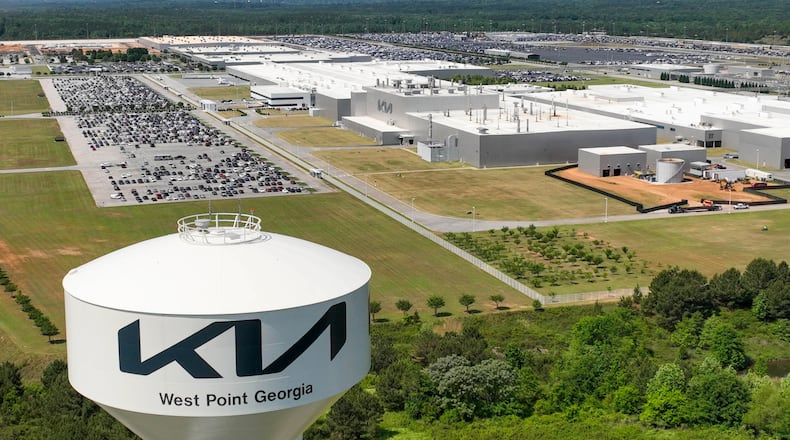Georgia’s sole automaker — the Kia manufacturing plant in West Point — has been accused in a lawsuit of taking part in a scheme to lure engineers from Mexico through fake job offers.
In the class-action lawsuit filed in U.S. District Court in Atlanta and amended late last month, lawyers representing the Mexican workers accused the Korean car maker of benefiting from “exploited” workers. The plaintiffs say they were lured to Georgia through a visa program meant for white-collar immigrants, but then ordered to work low-paid assembly line jobs.
Plaintiffs seek lost wages and benefits, as well an unspecified amount in compensatory and punitive damages.
When the suit was first filed last summer, the only Georgia based manufacturer named as a defendant was the auto parts maker Hyundai MOBIS. Hyundai and Kia share the same West Point facility, with Hyundai providing cockpit modules and front and rear chassis modules, among other parts, to Kia for final assembly.
Workers say they were hired as engineers or technicians, positions that met the criteria of the visa that granted them U.S. entry. But once settled in the state, they were put to work on Hyundai and Kia factory floors, where they performed “repetitive, production line manual labor,” according to the complaint.
“This case is really emblematic of a pattern that we’ve seen in this region and in this industry, where employers in these supply chains are misusing these visas,” said Ben Botts, legal director of the Centro de los Derechos del Migrante, a migrant workers organization that operates in Mexico and the U.S., and one of the entities representing the Mexican laborers in this case.
The amended complaint includes fresh details of abuse and intimidation allegedly suffered by workers while on the job, including threats of deportation and complaints that workers were being “too Mexican.”
One worker, an electrical engineer by training, said that in at least one week in September 2022, he was paid “far below” Georgia’s $7.25 minimum wage for his work at the Kia and Hyundai plant. That claim echoes the pattern of alleged wage underpayments and discrimination previously laid out by other plaintiffs, who say Mexican workers were paid less than U.S. workers performing identical or similar factory jobs.
There are over 200 individuals who are represented by the class action, based on the number of individuals with TN visas hired to work at Hyundai and or Kia, according to the complaint.
Kia Georgia did not return the AJC’s request for comment.
When the suit was originally filed, a Hyundai MOBIS spokesman told the AJC via email that the company is “an equal employment opportunity employer. MOBIS denies the allegations contained in the complaint and will vigorously defend the claim.”
In the latest update to the complaint filed in late December, four different labor recruiters and staffing agencies are also listed as defendants: SPJ Connect, Allswell, TESS and JKL. They’re accused of helping find and hire the migrants who would go on to work at Kia and Hyundai, allegedly at the direction of the manufacturers. All four are headquartered in Georgia except JKL, an Alabama company.
Experts say resorting to third-party labor contractors can help the owners of workplaces shirk responsibility in the event labor violations come to light.
“I think it’s really, really shocking that these types of conditions are present in these facilities,” Botts said. Kia and Hyundai “are well-known, visible, public companies that need to be holding themselves to a higher standard.”
Neither TESS nor JKL responded to requests for comments. A member of SPJ Connect’s and Allswell’s legal said in a statement that “There are two sides to every story, and we intend to vigorously defend the claims made against our clients.”
In response to allegations that Paul Lee, an Allswell and SPJ Connect executive, has threatened Mexican workers intent on quitting with deportation, a lawyer said on Lee’s behalf that the allegations tell “a one-sided version of the plaintiffs’ story which we dispute and intend to challenge in court.”
To legally bring Mexican workers into the U.S., the defendants relied on the Trade NAFTA — or TN — visa, meant to fill high-skilled jobs in the U.S. with Mexican and Canadian professionals. According to a list published by the U.S. Department of State, jobs as engineers and technicians are among the professions covered by the TN visa program. Assembly line work is not.
U.S authorities vet TN visa applications and job offers before migrants travel – and when they first arrive in the country – but experts say there is no oversight of the program once TN workers actually report to work.
Of the eight named plaintiffs in the amended lawsuit, just one currently resides in Georgia. Another, the only one who continues to work at the Hyundai and Kia plant, lives in Alabama. The rest have moved on to other U.S. states or have returned to Mexico.
Three of the named plaintiffs were among those who shared their stories last year with the AJC, for an investigation outlining migrants’ journeys from their homes in Mexico to Georgia factory floors.
About the Author
Keep Reading
The Latest
Featured


